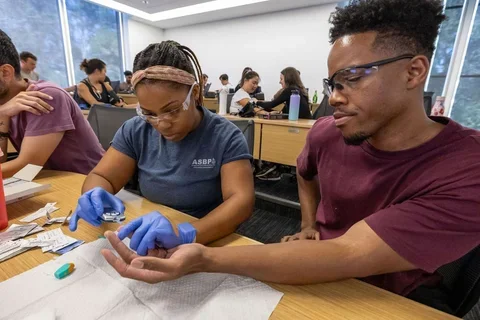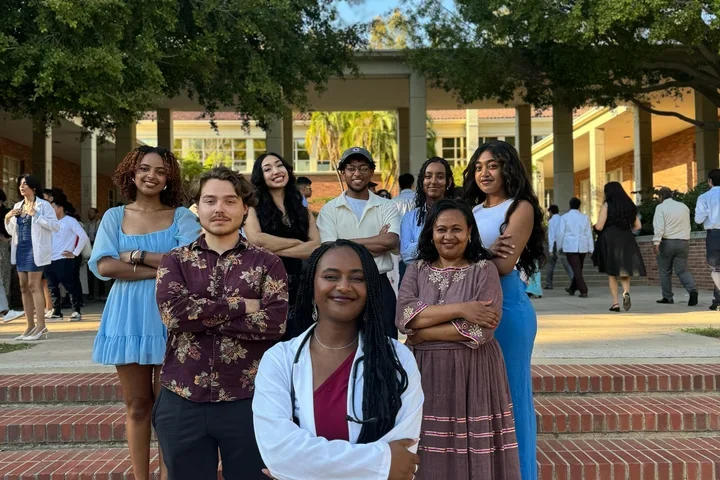From active duty to UCLA
Triniti Gistand’s journey from combat to medical school

Triniti Gistand, a second-year medical student at the David Geffen School of Medicine at UCLA, is no stranger to caring for patients in high-pressure situations. She began her health care career at just 17 years old, training as a medic with the California Army National Guard.
When the COVID-19 pandemic hit in 2020, she worked at the Palo Alto Veterans Affairs Medical Center. In 2021, she was deployed to the Middle East on active duty. She served as a medic at Camp Buehring in Kuwait and the Ain al-Asad base in Iraq as part of Operation Inherent Resolve.
“We provided support for the flight medics and the physicians that went out to take care of the combat casualties,” Gistand said.
During her deployment, Gistand initially considered applying to a physician assistant program — until a sergeant in her unit suggested a different path.
“He was like, ‘Why not try and be a physician?’ And I really didn’t have a good answer,” Gistand said. That exchange led her to studying health sciences at Cal State East Bay after returning to California. She continued working at the VA and was promoted to sergeant.
At the VA, Gistand served in the emergency room as an Intermediate Care Technician (ICT), a role for former military corpsmen and combat medics to use the specialized skills they acquired during active duty.
Memorable campus visit
She juggled her undergraduate studies and ICT duties, all while studying for the MCAT and applying to medical schools. Among many interviews at medical school programs, her visit to UCLA left the strongest impression.
“I remember most of the professors were like, “Oh, I went here for undergrad, and then I went here for fellowship, and then I wanted to work here as faculty,” Gistand said. “I thought that was really special. Not only were the people saying they loved the school and the culture, but they were showing it.”
She was accepted to the David Geffen School of Medicine in 2024.
“This has probably been my favorite chapter of my life,” Gistand said. “Getting to learn so much about the human body from so many experienced physicians is so special.”
Now in her second year, she is preparing for a clerkship in a familiar setting – the VA Psychiatry Division.
“It's kind of great to have that smooth transition,” Gistand said, “especially working with a population that I belong to.”
Music and medicine
Outside of the classroom, Gistand is a passionate musician, finding time to sing in choirs, local open mics, and during karaoke nights with colleagues and classmates. She is interested in combining her two loves – music and medicine – by pursuing a specialty in otolaryngology, which focuses on the ear, nose and throat.
“Working with singers would be my absolute dream,” she said.
Gistand also hopes to use her medical degree to address health disparities in Black communities.
“Black women in the United States are still three times more likely to die during childbirth regardless of socioeconomic status, which is just one example of many racial disparities in medicine,” Gistand said in an interview
earlier this year. “Being a Black woman in medicine means being able to add to the perspectives and voices that make decisions for Black patients.”
In November, she’ll be traveling to San Antonio to sing as a featured guest at the annual meeting of the Association of American Medical Colleges.
The experience will “connect my passions for music, medicine and service,” Gistand said.
Original article on UCLA Health: From active duty to UCLA



